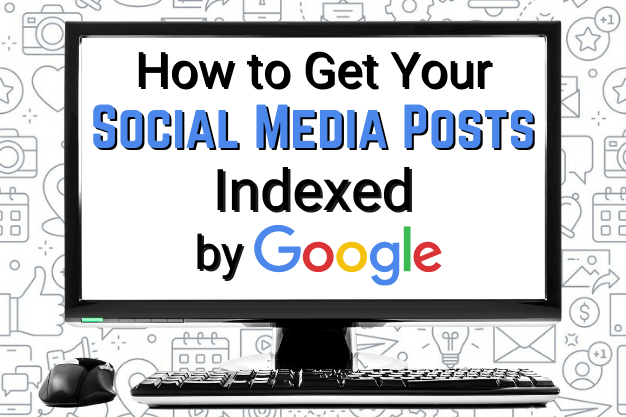If you’re in charge of SEO or social media for your business, I hope you’re aware that Google now indexes your social media posts. Google monitors the biggest social media platforms, from Twitter and Facebook to TikTok and Instagram.
Google indexes social media posts to keep people on its platform and give users information that is useful to them. Now, you can index your social media posts in order to rank higher in Google searches and generate more sales and revenue.
But what does indexing mean? How can you use it to get more views, traffic, and engagement? We’ve cracked the code. Keep reading to find out how to use Google’s post indexing to get the most out of your social posts.
What exactly is Google doing when it indexes something?
What is Google crawling? Google will pull results from social media sites like Facebook and Twitter based on what you search for and then show you anything it thinks is relevant to your search, from Facebook pages to tweets themselves.
As Google continues to add social media to its search results, social media will have a huge effect on rankings and visibility.
Google is making changes to how its platform is used and wants its users to see results from Facebook, Twitter, Instagram, TikTok, Pinterest, and other platforms instead of just websites. By indexing social media posts, Google’s goal is to remain the best search engine for all generations, even those who use social media for most of their searches.
Indexing social media posts simply means that Google crawls your social media sites (much like your website) for keywords, themes, and content. When people search for something, like “Best BBQ in Los Angeles,” their search results will include Yelp reviews that mention best BBQ in Los Angeles, Instagram posts from restaurants that rank for the key phrase “BBQ Restaurant” and a Twitter thread about LA’s best places for BBQ.
Even though things don’t look exactly like that right now, we think that’s where Google is headed as it starts to index posts from TikTok and Instagram.

It drives traffic to your business.
What does Google’s algorithm have to do with you?
It’s easy to act like the changes in Google and social media algorithms don’t affect your views, engagement, and bottom line.
Ignoring one or two algorithm updates isn’t going to hurt your business too much. Google is also a business, after all. If there were too many changes at once, people would stop using the search platform. And, with increased competition, Google can’t afford to annoy its users. But Google is slowly but surely making changes to how its algorithms work.
By integrating social media with Google’s platform, it makes it easier for people to find what they need on Google instead of going “off reservation” to other websites. Google is always improving and coming up with new ways to give its users the best experience possible. In a time when TikTok is trying to be as useful of a search engine as Google, it’s time to start integrating social media.
Businesses that don’t take social media seriously will eventually drop in rankings or risk losing their online visibility altogether. So the takeaway for today’s article is investing in social media is the smart move if you want to keep those coveted rankings on Google. Start indexing your social media posts to ensure you continue to dominate local search!
How to get Google to index social media posts…
So, how can you make sure that Google reads your social media posts? The answer is simple: use the same SEO techniques on your site that you already use.
If you already have a plan for local SEO, use the same methods on your social media accounts. Here’s what it looks like to have good SEO hygiene on social media:
Use hashtags and keywords that are important to your business.
Relevant keywords and hashtags will depend on where your business is and what it does. There are a lot of tools, including the social media platforms themselves, that can help you find relevant hashtags.
You should focus on keywords and hashtags that describe your business and help Google figure out where it is. A vegan bakery in New York City might use the hashtags #nyceats, #nycvegan, and #veganeats, for example.
Use keywords related to your business to find social media posts on Google. Writing captions and posts with lots of keywords will help you rank higher on both Google and the social platform. You can also add keywords and key phrases to the bottom of your post on sites like Instagram. So, you won’t sound like your content was written by an AI.

Make a bio with important details.
Fill out your page’s “about” page with correct, up-to-date information. Be detailed and informative, because the about section shows how you rank for certain keywords.
Link to your own website.
As always, having the same information about your business all over the internet helps Google classify it correctly. Even if you don’t want to, you should link to your website in your social media bios. So, customers can easily find their way to your website and come to your store more often. Just make sure your website is responsive and works well on phones.
How social media and your Google Business Profile can change the customer journey (formerly Google My Business)…
67% of searches don’t need a second click. That means that all a customer sees of your business are snippets of posts, tweets, Google and social media profiles, and your website or listings pages before deciding whether or not to buy from you. Every good piece of content counts, especially when a consumer is just skimming the first page of search results.
Customers are more likely to buy from you if they search for your business and see that you are active on your Google Business Profile and other social media sites. In fact, 53% of consumers say they prefer to buy from brands that are active on social media.
A stronger web presence inspires client confidence and reassures them that their satisfaction is your top priority.
So what’s the takeaway?
In the end, having your social media content indexed by Google will improve your ranking, make your customers happier, and bring in more revenue.
Customers love active, visible companies. And as Google changes its algorithm to include more social media in search results, it will be important to make sure your social media posts are SEO-friendly.

